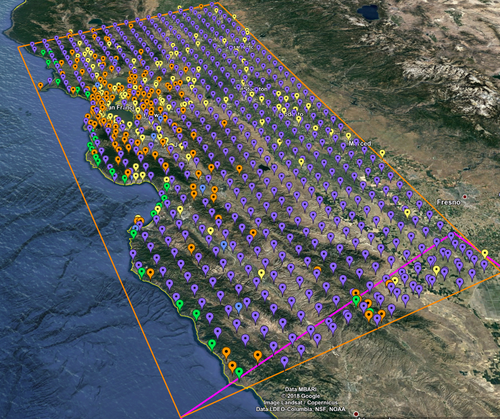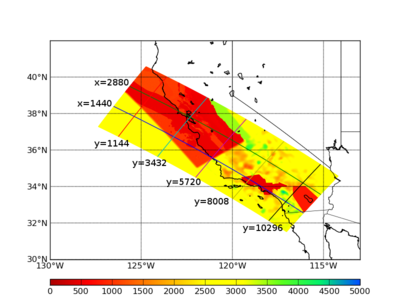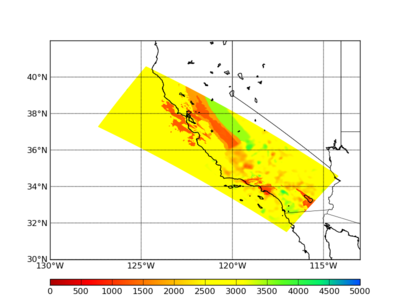Difference between revisions of "CyberShake Study 18.8"
| Line 69: | Line 69: | ||
*Y index=8008, (33.337800, -119.969500) to (36.461400, -117.180700) | *Y index=8008, (33.337800, -119.969500) to (36.461400, -117.180700) | ||
*Y index=10296, (32.133500, -117.991100) to (35.205700, -115.175300) | *Y index=10296, (32.133500, -117.991100) to (35.205700, -115.175300) | ||
| + | |||
| + | The southeast edge is on the left side of the plots. | ||
{| | {| | ||
| Line 82: | Line 84: | ||
*X index=1440, (38.385500, -126.495800) to (32.548400, -116.106300) | *X index=1440, (38.385500, -126.495800) to (32.548400, -116.106300) | ||
*X index=2880, (39.481600, -125.625400) to (33.565800, -115.163000) | *X index=2880, (39.481600, -125.625400) to (33.565800, -115.163000) | ||
| + | |||
| + | The northwestern edge is on the left of the plots. | ||
{| | {| | ||
Revision as of 05:23, 23 February 2018
CyberShake 18.3 is a computational study to perform CyberShake in a new region, the extended Bay Area. We plan to use a combination of 3D models (USGS Bay Area detailed and regional, CVM-S4.26.M01, CCA-06) with a minimum Vs of 500 m/s and a frequency of 1 Hz. We will use the GPU implementation of AWP-ODC-SGT, the Graves & Pitarka (2014) rupture variations with 200m spacing and uniform hypocenters, and the UCERF2 ERF. The SGT and post-processing calculations will both be run on both NCSA Blue Waters and OLCF Titan.
Contents
Status
This study is under development. We hope to begin in March 2018.
Science Goals
The science goals for this study are:
- Expand CyberShake to the Bay Area.
- Calculate CyberShake results with the USGS Bay Area velocity model as the primary model.
Technical Goals
- Perform the largest CyberShake study to date.
Sites
The Study 18.3 box is 180 x 390 km, with the long edge rotated 27 degrees counter-clockwise from vertical. The corners are defined to be:
South: (-121.51,35.52) West: (-123.48,38.66) North: (-121.62,39.39) East: (-119.71,36.22)
We are planning to run 874 sites, 843 of which are new, as part of this study.
These sites include:
- 77 cities (74 new)
- 10 new missions
- 140 CISN stations (137 new)
- 50 new sites of interest to PG&E
- 597 sites along a 10 km grid (571 new)
Of these sites, 32 overlap with the Study 17.3 region for verification.
A KML file with all these sites is available with names or without names.
Velocity Models
For Study 18.3, we are planning to query velocity models in the following order, to populate CyberShake volumes:
- USGS Bay Area model
- CVM-S4.26.M01
- CCA-06
- 1D background model
We will apply a minimum Vs of 500 m/s.
We will smooth to a distance of 10 km either side of a velocity model interface.
Vs cross-sections
We have extracted horizontal cross-sections at 0 km and 1 km. The 0 km cross-section also indicates the vertical cross-section locations.
We extracted vertical cross-sections along 5 cuts parallel to the x-axis:
- Y index=1144, (36.747700, -126.242500) to (40.009400, -123.599700)
- Y index=3432, (35.647400, -124.092900) to (38.866100, -121.389900)
- Y index=5720, (34.509900, -122.002600) to (37.682400, -119.251200)
- Y index=8008, (33.337800, -119.969500) to (36.461400, -117.180700)
- Y index=10296, (32.133500, -117.991100) to (35.205700, -115.175300)
The southeast edge is on the left side of the plots.
and 2 cuts parallel to the y-axis:
- X index=1440, (38.385500, -126.495800) to (32.548400, -116.106300)
- X index=2880, (39.481600, -125.625400) to (33.565800, -115.163000)
The northwestern edge is on the left of the plots.









